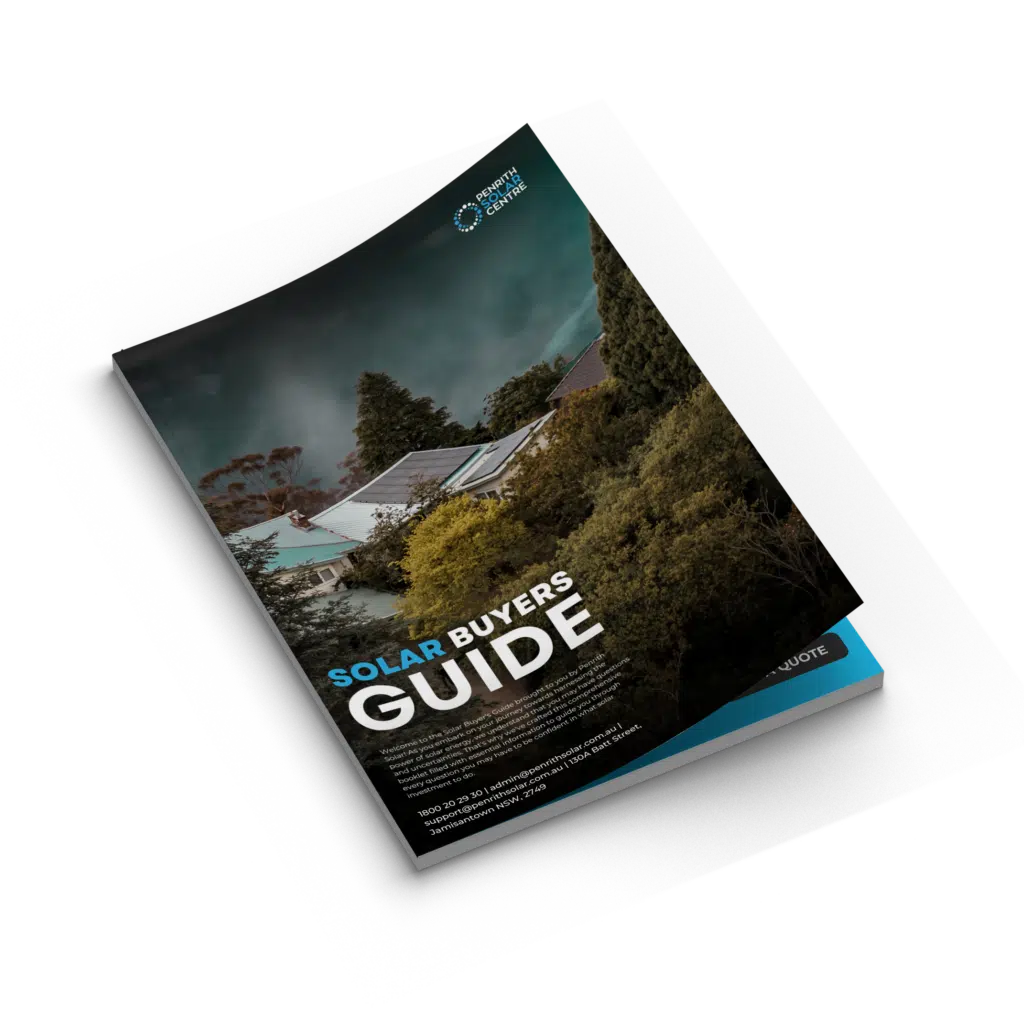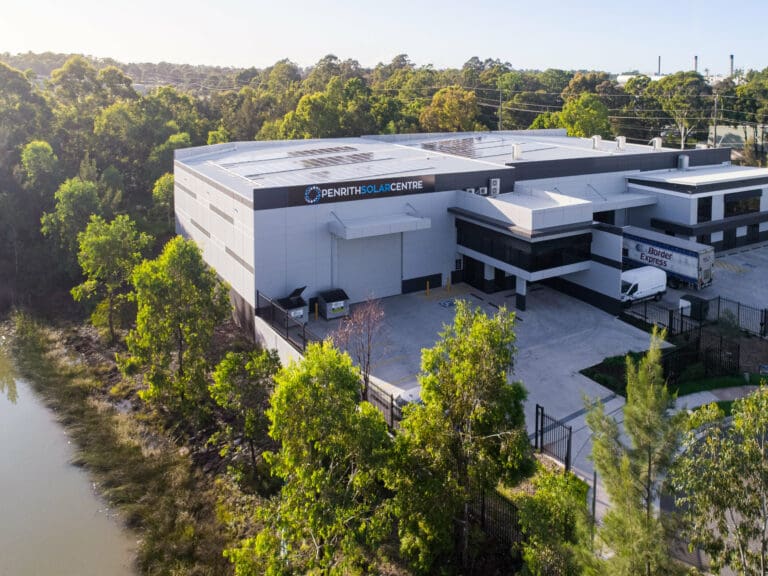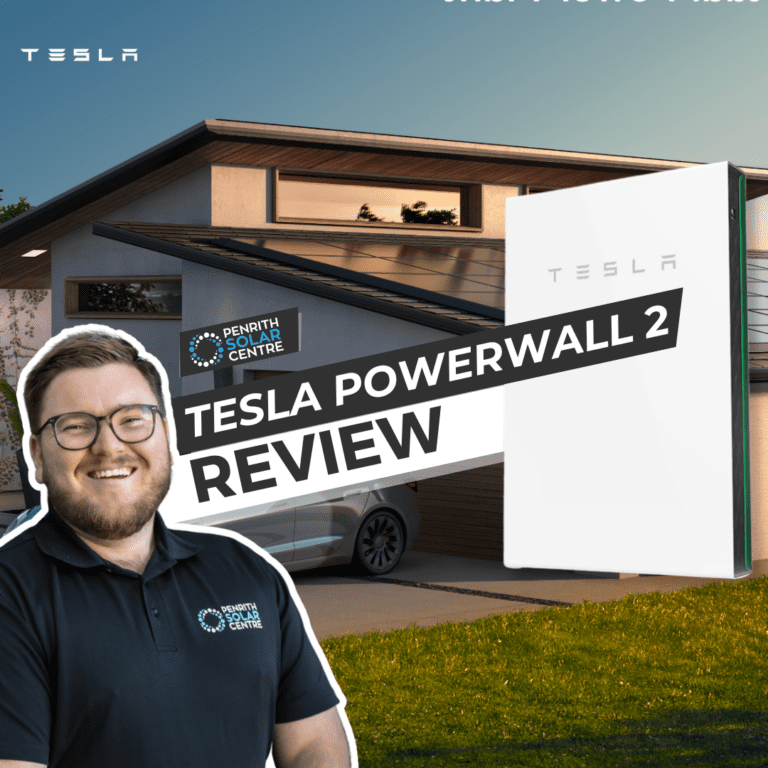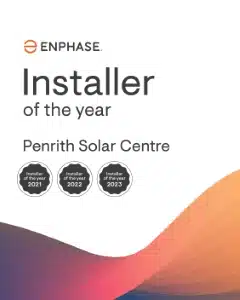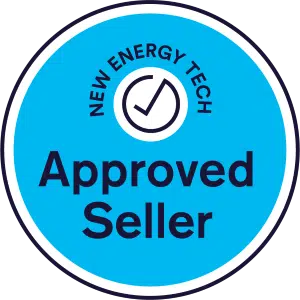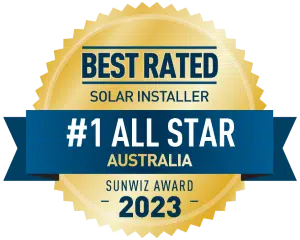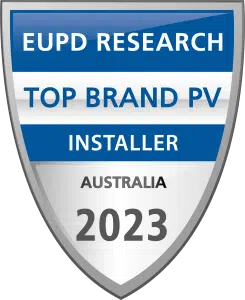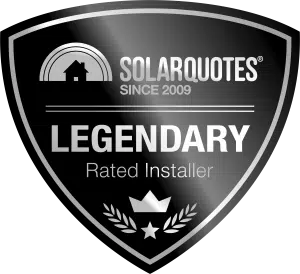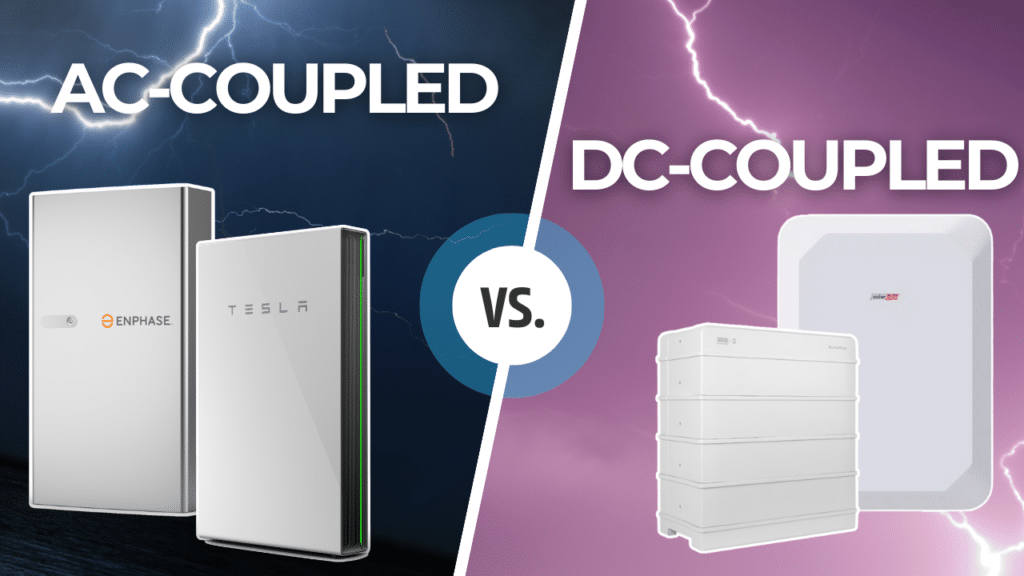
There are two types of solar batteries on the market because there are two different technologies vying for your attention: AC-coupled batteries and DC-coupled batteries. The word “coupled” here means how the battery is connected to the solar system on the roof – through AC or DC power (neither will chime 13 times when starting up though).
There are advantages and disadvantages to each type of solar battery. This choice in designing your system will affect other choices you’ll make in this investment. Which type of solar battery do you want to add to your solar system and when do you plan to do it?
At Penrith Solar Centre, we understand how complicated it can be to make decisions about your solar system. After all, the choices you make today will save you money in five, ten, and twenty years from now. It might be too much responsibility for an afternoon. We’re here to help you navigate these choices, so you feel secure in your solar journey.
In this article, you will learn:
- What is an AC-coupled Solar Battery?
- What is a DC-coupled Solar Battery?
- Pros and Cons of AC-coupled Solar Batteries
- Pros and Cons of DC-coupled Solar Batteries
- What is More Efficient: an AC-coupled or DC-coupled Solar Battery?
- Which Is Safer: an AC-coupled or DC-coupled Solar Battery?
By the end of this article, you’ll “shoot to thrill” any worries you have about AC/DC systems. Let’s get into it!
What is an AC-coupled Solar Battery?
In an AC-coupled system, solar panels collect DC power, which is then converted to AC power by microinverters attached to each panel. This AC power is used to run household appliances and lights, with any excess sent to the battery for storage.
However, batteries can only store energy in DC form. So, the surplus AC power destined for the battery needs to be converted back to DC energy. This conversion is carried out by inverters or microinverters in the battery, depending on the brand.
But here’s where it gets a bit more complicated: any electricity sent back to the grid must be in AC form. This means there’s yet another conversion back to AC power before it can be sent back to the grid.
Here’s a handy flow chart to help make sense of how electricity moves in an AC-coupled system:
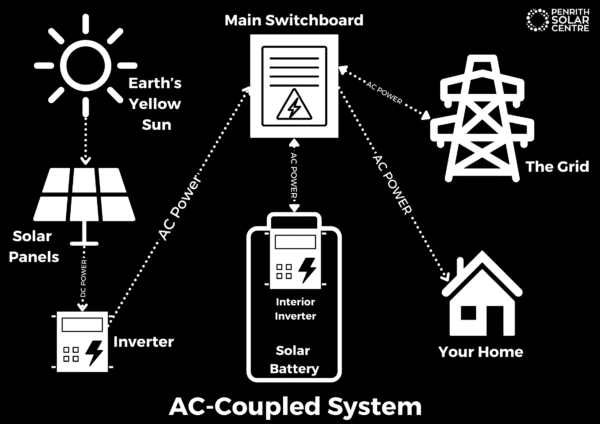
If you’re interested in learning a bit more about AC-coupled solar batteries, you might want to check out the following article titled, Is the Tesla Powerwall 2 Worth It? Cost, Specs, Bill Savings & More.
Enquire About AC-coupled Batteries!
What is a DC-coupled Solar Battery?
DC-coupled batteries have been around longer than their AC-coupled counterparts. In this system, DC power from a string of solar panels is sent to the inverter and redirected to the battery or the switchboard.
When the hybrid inverter feeds a DC-coupled battery, it charges the battery without converting the power to AC first. The conversion to AC happens later when the electricity is needed for use, either at home or for the grid.
Unlike AC-coupled systems where the inverter is integrated into the solar panel or battery, in DC-coupled systems, the inverter is a separate device usually installed outdoors. This device manages the flow of AC power, directing it to the home or the grid. This type of inverter is often referred to as a hybrid inverter.
Here’s another handy flow chart to help make sense of how electricity moves in a DC-coupled system:
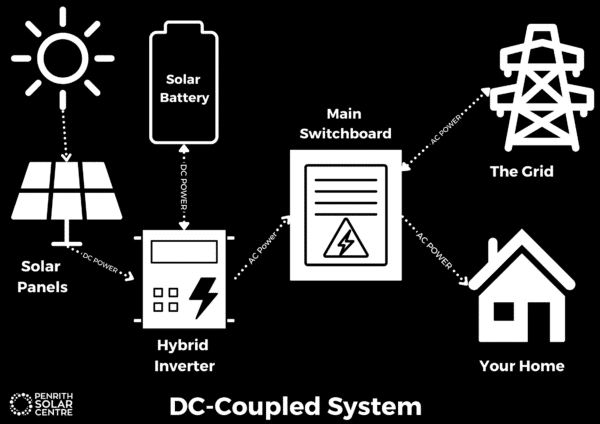
If you’re interested in learning more about solar batteries, you might want to check out the following article titled, Enphase IQ Battery 5P Review.
Pros and Cons of AC-coupled Solar Batteries
Here are some Pros and Cons of AC-coupled batteries…
Pros:
- Retrofitting is a fancy term that folks in the solar industry use when talking about adding a battery to an existing solar system. AC-coupled batteries are much more compatible with different solar technologies than DC-coupled batteries.
- There’s no central point of failure in an AC-coupled system. If the hybrid inverter fails in a DC-coupled system, everything stops. In an AC-coupled system where there is no central point of failure, the solar panels will continue supplying the home with electricity regardless of what’s happening with the battery.
- The battery and the solar panels operate independently. If the panels are not generating enough electricity, the battery can charge from the grid. This is an amazing benefit when it comes to connecting your battery to a VPP and taking advantage of time-of-use tariffs.
Cons:
- AC-coupled batteries are more expensive than DC-coupled batteries. There are more components that drive up the price. Some batteries like the Enphase IQ Battery 5P have multiple inverters within them which is a huge advantage because they’re easily replaceable and offer even fewer points of failure than a battery with one inverter doing all the conversion work.
- Every time the power is converted from DC to AC, there is a loss of energy. These processes add up, and over time the entire system is less efficient than a DC-coupled battery system. The efficiency varies from brand to brand, but in general, an AC-coupled battery is between 90 – 94% efficient while a DC-coupled battery is about 98% efficient. That energy loss is translated into cost and that cost adds up over time. 4 – 8% of 10kWh will add up over the course of a year and then over the lifetime of the system.
If you’re interested in learning more about AC-coupled solar battery options, you might want to check out the following article titled, What is the Lifespan of the Enphase IQ Battery 5P?
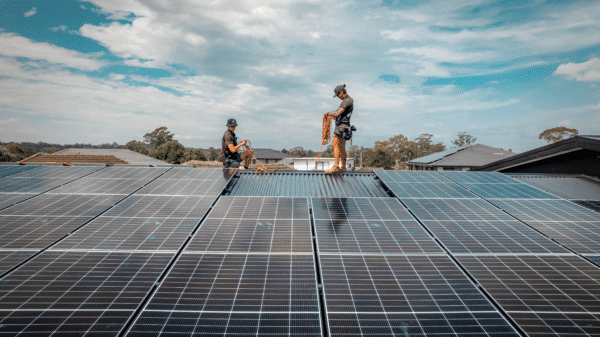
Pros and Cons of DC-coupled Solar Batteries
Pros:
- As we mentioned before DC-coupled batteries are 4 – 8% more efficient than AC-coupled batteries because the whole system turns DC electricity to AC electricity and back less often.
- The upfront cost of a DC-coupled battery is less than an AC-coupled battery.
Cons:
- Retrofitting a DC-coupled battery is very difficult. DC-coupled batteries are only compatible with certain types of hybrid inverters (like Tigo) and solar systems (like SolarEdge). AC-coupled batteries are compatible with virtually any solar array. They are truly brand-agnostic.
- Because there’s only one hybrid inverter in the system, if it fails, the whole system goes down. It’s a huge problem that could lead to spending more money long-term. Make sure you read up on the manufacturer’s warranties. As we mentioned, an AC-coupled solar system has multiple inverters or microinverters that allow the panels and the battery to act independently.
If you’re interested in learning more about the pros and cons of different solar batteries, you might want to check out the following article titled, Tesla Powerwall 2 Review.
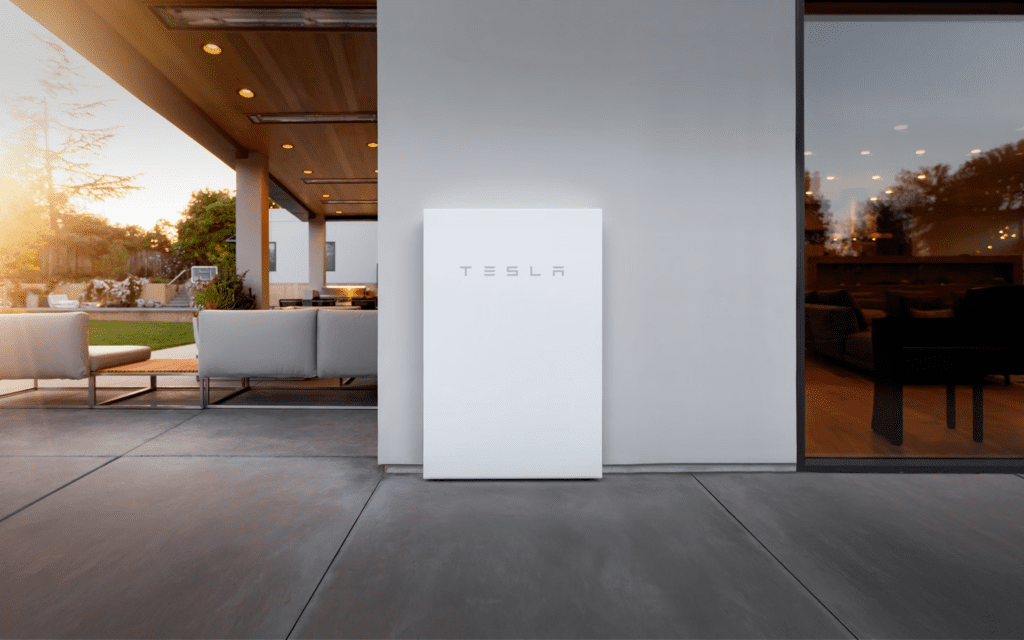
What is More Efficient: an AC-coupled or DC-coupled Solar Battery?
If you’ve got a DC-coupled battery, you’ll need a hybrid inverter to output AC power to the main switchboard and output DC power to the solar battery.
That hybrid inverter (with a 5 – 10 year warranty) will be bidirectional and constantly converting AC to DC and back again 24 hours a day, 7 days a week. It’s charging and discharging instantaneously often. If that hybrid inverter fails, you lose solar and battery power because of this central point of failure.
Although the DC conversion rate may be a tiny little bit more efficient, you roll the dice on having a central point of failure. It would be wise to ask solar sales reps to help you calculate the cost of replacing a hybrid inverter against the cost of that 4 – 8% efficiency a DC-coupled system provides. We’d do it for you, but those figures will vary widely depending on your unique needs and goals. But it’s a great question to ask when you’re shopping for a DC-coupled system.
With something like an Enphase system with an Enphase IQ Battery 5P, or an Enphase solar system with Tesla Powerwall 2, you don’t have a central point of failure. The battery can fail and not affect the solar, and the solar can fail and not affect the battery.
The other advantage of having an AC-coupled battery is that you can pull more energy at any given time.
For example: a Powerwall 2 has a 5kW inverter in it, and you’ve also got 5kW of solar production during the day. If your solar is producing 100%, you can pull 5kW from the battery and 5kW from the solar panels for a total of 10kW to use.
If it’s a DC coupled system – let’s say the inverter is 5kW and the battery is 5kW – and your solar panels are producing 100%, you’re limited to 5kW. There’s only one hybrid inverter there, so it can only give you 5 kilowatts of converted AC power to use.
So, the peak power output during the day of an AC-coupled solution is far better.
If you’re interested in learning more about AC-coupled batteries, you might want to check out the following article titled, Enphase IQ Battery 5P vs Tesla Powerwall 2: Which is Right for You?
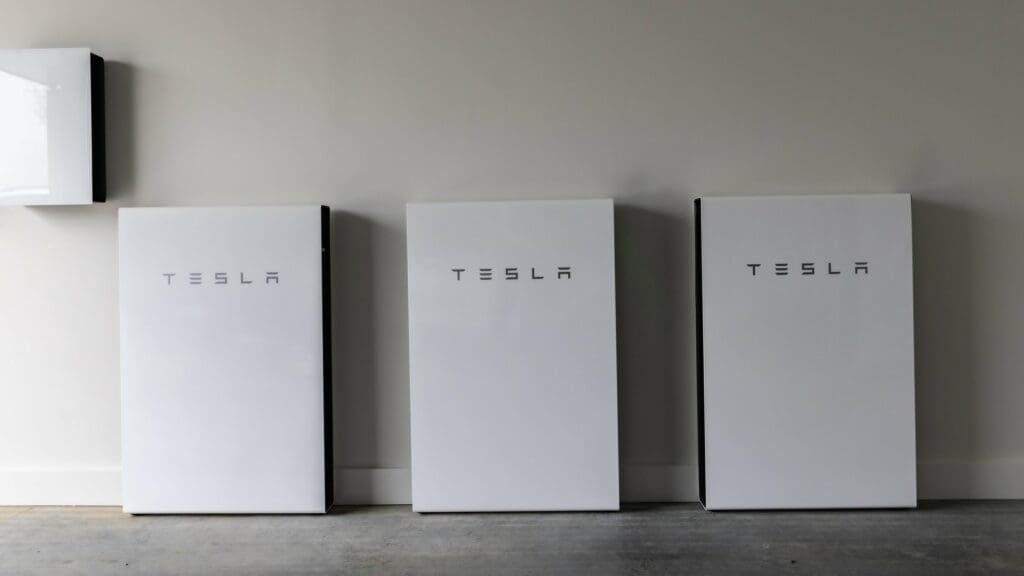
Which Is Safer: an AC-coupled or DC-coupled Solar Battery?
This is an important topic that is often breezed past on different solar blogs. In fact, when you Google “which is safer: an AC-coupled or DC-coupled solar battery” the results all have something to do with efficiency.
An AC-coupled system is exponentially safer than a DC-coupled system. Period.
It’s not an issue of brands competing for superior technology. When we talk safety, we’re talking science. DC power is more volatile than AC power.
At Penrith Solar Centre, safety is our first priority. For you and for our team of installers. Because of this, we are fully against DC-coupled batteries.
DC-coupled systems are made up of solar panels connected in series, outputting 600 volts of power through a cable that flows to the hybrid inverter installed on the side of the house. That’s kind of a long journey for a volatile type of electricity. Especially when compared to risks of an AC-coupled system.
In an AC-coupled system, the DC power is converted to AC power at the solar panel because the microinverter doing the job is mounted directly beneath each panel. Then the power flows to the main switchboard in the home at 230 volts.
This is what voltage in an AC circuit looks like compared to voltage in a DC circuit:

If a DC cable is subject to a fault, the continuous steady stream of electricity is harder to stop, unlike AC voltage which switches between positive and negative 50 times a second (50Hz), making it easier to isolate any arc faults.
This safety advantage is why AC is widely used for electricity in buildings worldwide, including Australia.
Faults in DC-couped systems can happen for various reasons:
- Poor installation of DC cabling, such as loose terminals, mismatched plugs, damaged insulation, or incorrect cable sizing.
- Low-quality DC components (like isolators, connectors, or cables), lead to water ingress or poor performance.
- Damage to the DC cabling from animals or construction work, causing insulation damage.
- Aging of DC cabling, isolators, and connections, leads to corrosion and degradation of insulation, which can result in arc faults due to increased impedance and exposed conductors.
If you’re looking at that list of bullet points and thinking to yourself, “You know, it seems like what a system needs is a good installer” then you’d be exactly right. Your installer is the most important decision you’ll make when installing a solar system.
One last point on safety: we’ll often see solar articles online discussing how difficult it is to service microinverters that are up on the roof of your house. They recommend investing in a string inverter system or a string system with a hybrid inverter, which is installed on the side of the home. They praise this inverter for being easier to service than microinverters.
Your hybrid inverter that’s charging and discharging volatile electricity constantly every day is within a meter of the ground. Your children are within a meter of the ground as well as your hybrid inverter. Why would you want a high-voltage product off the roof and installed at eye level?
If you’re interested in learning more about the importance of who you want to choose as an installer, you might want to check out the following article titled, In-house Installers vs. Subcontractors: Which is Better?
Battery Late Than Never: Wrapping Things Up
Now you know the difference between an AC-coupled system and a DC-coupled system. While an AC-coupled system offers wider compatibility and lacks a central point of failure, a DC-coupled system is more efficient. Which solar battery system you invest in depends largely on your solar needs and goals.
At Penrith Solar Centre, we’re here to help you along in your solar journey. We want you to be an informed customer. An informed customer will get the most out of their investment because they’ll know which questions to ask when it comes time to work out a quote for your solar needs and goals.
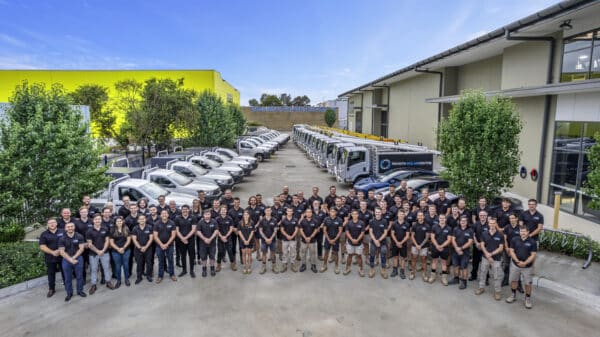
If you’re interested in learning more about what type of battery might be right for you, you might want to check out the following article titled, 6 Best Solar Batteries on the Market.
